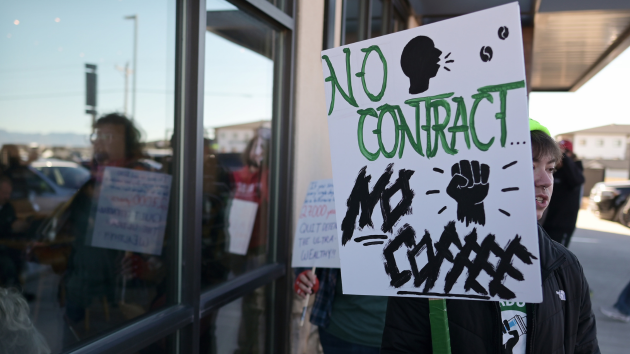Frustrated employees are ‘loud quitting’: What to know about the trend
Written by ABC Audio ALL RIGHTS RESERVED on July 13, 2023

(NEW YORK) — First there was ” quiet quitting,” then there was ” quiet hiring,” and now the latest workplace trend is “loud quitting,” new data shows.
Nearly 1 in 5, or 18%, of employees around the world are “actively disengaged” in their jobs, according to Gallup’s annual State of the Global Workplace report, released this month — down one percentage-point from the previous year.
In addition, 51% of currently employed workers said they are watching for or actively seeking a new job, and stress levels among employed workers are at a record high, according to Gallup.
All of those factors contribute to the trend of loud quitting, according to Jim Harter, Ph.D., chief scientist of workplace management and wellbeing for Gallup’s Workplace Management Practice.
“[Loud quitting] is when people aren’t just unhappy at work — they’re resentful that their needs aren’t being met and they’re acting out on that unhappiness,” Harter told ABC News’ Good Morning America. “Workers in this category tend to undermine what the organization is trying to get done and share their discomfort with others in the organization and even outside the organization.”
Harter added that loud quitters often feel more stress than other employees, and are much more likely to be actively looking for another job.
“It isn’t a state that’s good for them or their employer,” he said.
Laura Gassner Otting, a bestselling author and career coach, said a person who is loud quitting may send disruptive emails or make “inappropriate outbursts” at work. Outside the office, the employee may post on social media, for example, about internal company decisions and policies or negative communications with managers.
“It’s usually not the first time these issues have been raised by the loud quitting employee, but a ‘final straw’ type action after frustration with obstinate managers has built over time,” the Wonderhell author told GMA.
Loud quitting, which can also be known as being actively disengaged, stands in contrast to quiet quitting, which sees people keeping their jobs, but mentally stepping back from the burdens of work — for example, working only the required number of hours and not making their jobs an important center of their lives.
In the wake of the pandemic, which blurred the lines between work and home, quiet quitting became a greater trend, as workers, particularly young people, sought to establish boundaries between their personal and professional lives.
The new Gallup report found that quiet quitting is continuing to grow, with nearly 6 in 10 employees falling into the category.
According to the report, disengaged employees — the combination of loud quitting and quiet quitting — cost the global economy $8.8 trillion.
“It all kind of stems from people getting disenfranchised with the organization because they’re not really getting their needs met as an employee,” Harter said of workers’ overall frustrations. “Most people want to come to work and want to make a difference, but when they don’t know what their role is and they don’t feel rewarded for the work they’re doing, they tend to start over time developing those tendencies.”
Gassner Otting noted that neither quiet quitting or loud quitting are new concepts, but ones that have had a reemergence due in part to unexpected workplace changes during the pandemic.
She said the pandemic helped employees feel an increased sense of control in how and when they worked, while managers struggled to adapt to not having employees at work in an office.
“When you put these together, as some of us come back from the office, both employees and managers are learning how to work with each other in a new way,” she said. “Like a college student coming home for summer break, the employee has newfound independence and confidence, but the manager stayed the same.”
Takeaways for employees and employers
Both Gassner Otting and Harter said even though it is employees who are loud quitting, blame doesn’t lie entirely with them.
“If organizations put the right plans in place and make work more predictable, and have managers who are really skilled to manage in this new environment, then I think we can develop workplaces that are better than they’ve ever been,” Harter said. “Leaders need to take away the learnings on the positive side but also know they’ve got to regroup in terms of how they provide the kind of management for people where they can thrive at work.”
Part of the responsibility on managers’ part is to have at least one “meaningful conversation” per week with each employee they manage, no matter where they are, according to Harter.
“For managers to have a meaningful conversation means they need to be recognizing people when they do good work, which means they have to be in touch with their work,” he said. “They need to continuously reset goals and priorities so that people are involved in setting those goals and priorities, and then they need to focus on their strengths so that they can really point people in a direction where they can develop high-level competencies inside the organization.”
Gassner Otting said managers can gauge the strength of their relationship with their employees if the employees can answer “yes” to these four questions:
– Do they feel empowered to ask for feedback?
– Do they have agency/influence about how they work?
– Do they have an understanding of why their work matters?
– Do they understand and have a say in the metrics that are being used to rate their work?
For employees, Gassner Otting said it’s important to make yourself heard at work before your disengagement reaches the level of loud quitting.
“No one loud quits without becoming frustrated that they aren’t seen or heard first, so make your voice heard,” she said. “Raise your concerns, your hopes, your expectations, your confusions with your manager. It might be that you simply can’t see the sightlines into why your work matters, how it will speed your career trajectory, or bring you increased salary or satisfaction in the near term unless you ask.”
In addition, if quitting becomes the option, Gassner Otting said it’s important to think strategically so you’re “running towards the next job,” versus just running away from your current one.
“First, think about what you like about the job, culture, or mission, not just what you don’t like about the job, culture, or mission,” she said, adding, “Second, in your deliberations, think both about the job itself, but also how the job affects other parts of your life … The next job you’ll want will need to satisfy both the on-the-job time but also the off-the-job time too.”
She said that most times, in the end, no one wins by loud quitting.
“The ‘I’ll teach them a lesson’ flame out feels good in the moment, but is it smart long-term?” Gassner Otting said. “Ask yourself if you are solving an actual problem by doing this, or simply solving your ego’s need to finally yell loud enough to be heard.”
Copyright © 2023, ABC Audio. All rights reserved.

 KVSP
KVSP 




